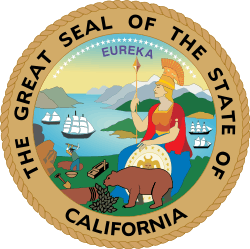California Proposition 34, 2012
| Elections in California | ||||||||||
|---|---|---|---|---|---|---|---|---|---|---|
 | ||||||||||
|
||||||||||
|
||||||||||
Proposition 34 was a California ballot measure that was decided by California voters at the statewide election on November 6, 2012. It sought to repeal Proposition 17, originally passed by voters in 1972, thus abolishing the death penalty in California.
The proposition was defeated 52% against to 48% in favor,[1] despite the fact that supporters had spent 6 times more money in the campaign than opponents.[2]
Background
A coalition of law enforcement officials, murder victims’ family members, and wrongly convicted people launched the initiative campaign for the “Savings, Accountability, and Full Enforcement for California Act”, or SAFE California, Prop. 34.[3] If it had been passed by California voters on November 6, 2012, Prop. 34 would have replaced the death penalty with life imprisonment without the possibility of parole, require people sentenced to life in prison without the possibility of parole to work in order to pay restitution to victims’ families, and allocate approximately $30 million per year for three years to police departments for the purpose of solving open murder and rape cases.[4] Prop. 34 was ahead in the most recent Los Angeles Times poll when voters heard about "the financial ramifications and details of [Prop. 34's] effect on prisoners." [5]
On March 1, 2012, the SAFE California Campaign submitted 799,589 signatures to qualify for the election on November 6, 2012.[6] On April 23, 2012 California Secretary of State Debra Bowen announced that the initiative had been approved and would be on the November ballot.[7]
Proponents
Proponents of Prop. 34 cite the cost of implementing the death penalty as a major motivating factor behind the initiative.[8] A 2011 study by former prosecutor and federal judge Arthur Alarcón indicates that California has spent approximately $4 billion to execute 13 people since the death penalty was reinstated.[9] The Legislative Analyst's Office official analysis of the proposition shows that Prop. 34 will likely save taxpayers over 100 million dollars per year.[10]
Proponents of Prop. 34 also cite the possibility of executing an innocent person as a major motivating factor behind the initiative.[11] A recently released study by the Chief Justice Earl Warren Institute on Law and Social Policy at University of California, Berkeley, School of Law, shows that California's rate of wrongful convictions is the highest in the nation.[12]
Supporters of Prop. 34 include:
- The California Democratic Party[13]
- The California Nurses Association[13]
- The League of Women Voters of California[13]
- The California State NAACP[13]
- All the bishops of the Roman Catholic Church in California.[14]
- All the bishops of the Episcopal Church in California.[15]
- Jeanne Woodford, the former Warden of San Quentin State Prison who presided over four executions;[16]
- Gil Garcetti, the former District Attorney of Los Angeles County;[17]
- Franky Carrillo[18] and Obie Anthony,[19] who were wrongly convicted of murder and spent decades in prison before their exoneration;
- Deldelp Medina[20] and Aqeela Sherrills,[21] family members of murder victims;
- Don Heller,[22] the author of the 1978 initiative that expanded the use of the death penalty in California;[23]
- Ron Briggs,[24] a main proponent of the 1978 initiative that expanded the use of the death penalty in California.[23][25]
Opponents
Some Prop. 34 detractors do not believe the studies that indicate that the death penalty in California is more expensive than life in prison without the possibility of parole.[26] Others admit that the system is broken, but hold out hope that it can be fixed, despite the fact that "reform attempts have failed to make it past the California State Legislature."[27]
When proposition 34 was defeated, Michael Rushford, a death penalty supporter, said the election was a call for California officials to "streamline the appeals process, expand the pool of defense attorneys qualified to handle capital cases, and execute inmates with a single lethal drug instead of the three-drug mixture now used".[2]
References
- ↑ "Statement of Vote – November 6, 2012, General Election" (PDF). California Secretary of State Debra Bowen. p. 13. Retrieved December 31, 2015.
- 1 2 https://www.google.com/hostednews/ap/article/ALeqM5gquIMgeR1ld7hT0r2x5K26IEtwIg?docId=661fb8e4c49646868cd9a158b4eef211
- ↑ "Supporters". SAFE California. Retrieved August 24, 2014.
- ↑ "Archived copy". Archived from the original on November 11, 2012. Retrieved 2012-11-04.
- ↑ https://web.archive.org/web/20121215212558/http://www.latimes.com/news/local/la-me-poll-death-penalty-20121026,0,7370020.story. Archived from the original on December 15, 2012. Missing or empty
|title=(help) - ↑ "PolitiCal". Los Angeles Times. March 1, 2012.
- ↑ http://www.sos.ca.gov/elections/ballot-measures/qualified-ballot-measures.htm
- ↑ http://www.safecalifornia.org/facts/savings
- ↑ Williams, Carol J. (June 20, 2011). "Death penalty costs California $184 million a year, study says". Los Angeles Times.
- ↑ http://vig.cdn.sos.ca.gov/2012/general/pdf/34-title-summ-analysis.pdf
- ↑ http://www.safecalifornia.org/facts/innocence
- ↑ http://www.law.berkeley.edu/files/CAWrongfulConvictionsPrjFactSheetFINAL.pdf
- 1 2 3 4 http://www.safecalifornia.org/about/other-organizations
- ↑ http://www.cacatholic.org/index.php/issues2/reverence-for-life/death-penalty/538-prop-34-support
- ↑ http://episcopaldigitalnetwork.com/ens/2012/10/10/california-bishops-release-statement-supporting-proposition-34/
- ↑ http://www.safecalifornia.org/stories/enforcement/woodford
- ↑ http://www.safecalifornia.org/stories/enforcement/garcetti
- ↑ http://www.safecalifornia.org/stories/innocent/carrillo
- ↑ http://www.safecalifornia.org/stories/innocent/obies-story
- ↑ http://www.safecalifornia.org/stories/victims/medina
- ↑ http://www.safecalifornia.org/stories/victims/sherrills
- ↑ http://www.safecalifornia.org/stories/new-voices/heller
- 1 2 Nagourney, Adam (April 6, 2012). "Fighting to Repeal California Execution Law They Championed". The New York Times.
- ↑ http://www.safecalifornia.org/stories/new-voices/ron-briggs
- ↑ Briggs, Ron (February 12, 2012). "California's death penalty law: It simply does not work". Los Angeles Times.
- ↑ http://www.politico.com/news/stories/0412/75540_Page2.html
- ↑ http://www.neontommy.com/news/2012/05/cast-converts-rally-around-death-penalty-repeal
External links
- Official CA Voter Information Guide - Proposition 34
- Official Yes on Prop 34 website
- Official No on Prop 34 website